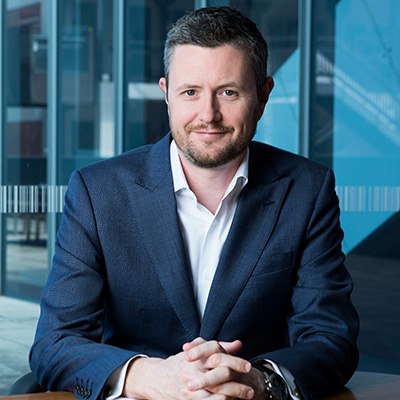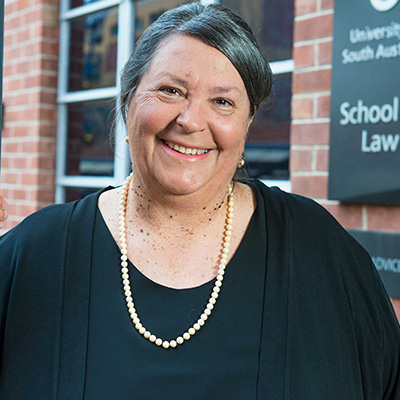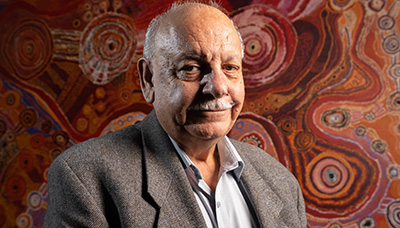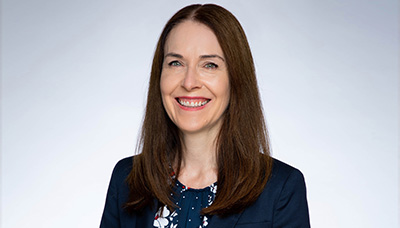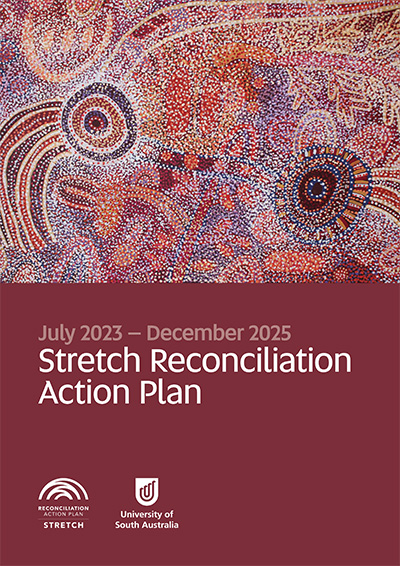Acknowledgement of Peoples and Country
Kaurna miyurna, Kaurna yarta, ngadlu tampinthi
We respectfully acknowledge the Kaurna, Boandik and Barngarla First Nations Peoples and their Elders past and present, who are the First Nations’ Traditional Owners of the lands that are now home to the University of South Australia’s campuses in Adelaide, Mount Gambier and Whyalla. We are honoured to recognise our connection to the Kaurna, the Boandik and the Barngarla lands, and their history, culture and spirituality through these locations, and we strive to ensure that we operate in a manner that respects their Elders and ancestors. We also acknowledge other First Nations lands across Australia with which we conduct business, their Elders, ancestors, cultures and heritage.
Kaurna
UniSA tampinthi, UniSA Kaurna yartangka yuwanthi.
Kaurna miyurna yaitya mathanya Wama Tarntanyaku. Parnaku yailtya, parnaku tapa purruna, parnaku yarta ngadlu tampinthi.
Yalaka Kaurna miyurna ithu yailtya, tapa purruna, yarta kuma puru martinthi, puru warri- apinthi, puru tangka martulyainthi.
We acknowledge that the University of South Australia is on the traditional Country of the Kaurna people of the Adelaide Plains. We recognise and respect their cultural heritage, beliefs and relationship with the land, and we acknowledge that they are of continuing importance to the Kaurna people living today.
Boandik
Ngathu putama nhu mraat, mraat Boandik-at wulnuwitjara Berrinat ba mraatat mingro Berrin.
I recognise this Country (is) the Country of the Boandik, the Custodians of Mount Gambier and the Country around Mount Gambier.
Barngarla
Ngarrinyarlboo nagoodoo Barngarla mirinyi yoorari yarda malboo. Ngarrinyarlboo nagoodoo Barngarla yoorari yarda wardana indoo.
We acknowledge and respect the Barngarla people as the Traditional Custodians of the ancestral lands. We acknowledge the deep feelings of attachment and relationship of Barngarla people to the Country and the sea.
Opening statements
Reconciliation Australia
On behalf of Reconciliation Australia, I congratulate the University of South Australia on its formal commitment to reconciliation, as it implements its second Stretch Reconciliation Action Plan (RAP) – its third RAP overall.
The RAP program provides organisations with a framework to contribute to the reconciliation movement through the pillars relationships, respect and opportunities. This framework allows for continuous development, pushing organisations to constantly embed and expand on their commitments, while adapting to obstacles and circumstances as they arise.
There is greater understanding than ever before of the role that Australia’s Universities must play in the reconciliation movement. This role is not only about righting the historical and contemporary wrongs committed by educational institutions, but so too about Universities’ duties to elevate crucial First Nations knowledges as the world faces increasingly complex challenges.
It is clear observing UniSA’s reconciliation journey so far that the University has recognised this responsibility and its unique place within this charge, continuously and systematically integrating principles of reconciliation across its operations.
Exemplary of this is in its previous Stretch RAP was the University’s establishment of the Purkarninthi in Residence, as well as its Yurirka: Proppa Engagement with Aboriginal Peoples. These initiatives show the University prioritising considered and strong practices and governance to form the foundations of its relationships with Aboriginal and Torres Strait Islander people.
This new Stretch RAP is expanding on this impressive trajectory, with its new Aboriginal Knowledges Centre encapsulating all the University has learnt on its journey so far.
Over time, the University has developed a focus on two-way knowledge sharing and understanding – based in the teachings of its Fellow, Dr Uncle Lewis Yarlupurka O’Brien – which will culminate in this interdisciplinary Centre. The Centre will help inform research going forward, but so too influence the whole of the University’s interactions with Aboriginal and Torres Strait Islander peoples, and the cultural safety of its working environment.
Overall, this new Stretch RAP sees UniSA take its next exciting steps as it works to embed reconciliation across its campus, workforce and research, challenging itself while also building on its accomplishments from its previous RAPs.
On behalf of Reconciliation Australia, I commend the University of South Australia on this Stretch RAP and look forward to following its ongoing reconciliation journey.
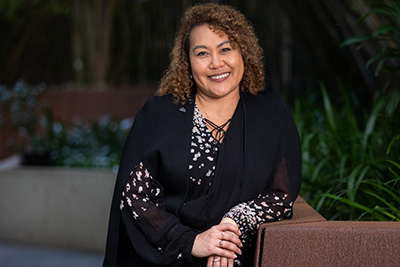
Karen Mundine
Chief Executive Officer
Reconciliation Australia


